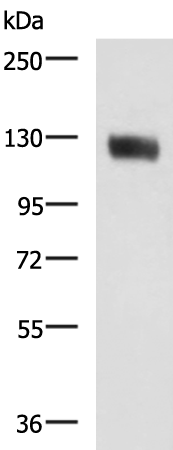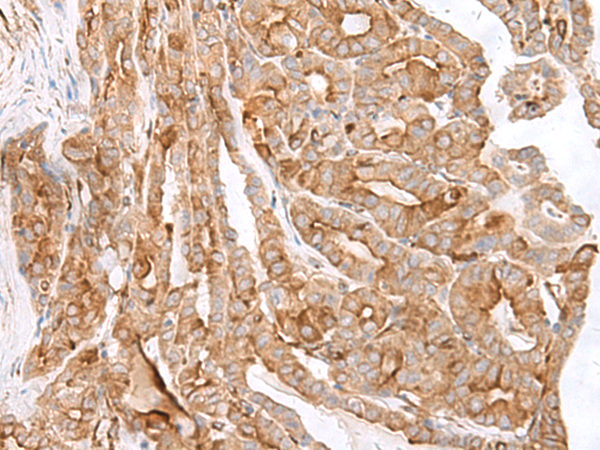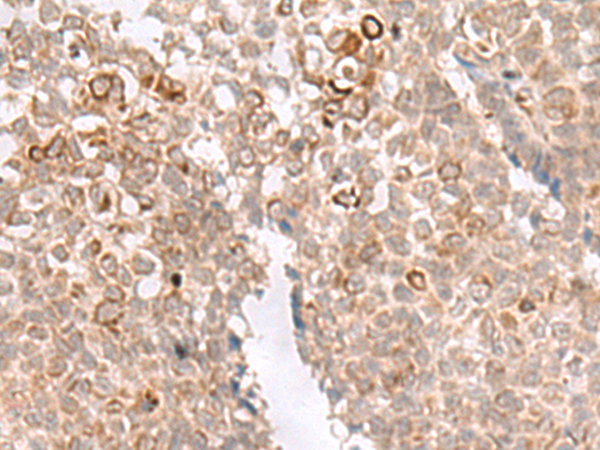


| WB | 咨询技术 | Human,Mouse,Rat |
| IF | 咨询技术 | Human,Mouse,Rat |
| IHC | 1/40-1/200 | Human,Mouse,Rat |
| ICC | 技术咨询 | Human,Mouse,Rat |
| FCM | 咨询技术 | Human,Mouse,Rat |
| Elisa | 1/5000-1/10000 | Human,Mouse,Rat |
| Aliases | CD146; MUC18; HEMCAM; METCAM; MelCAM |
| WB Predicted band size | 72 kDa |
| Host/Isotype | Rabbit IgG |
| Antibody Type | Primary antibody |
| Storage | Store at 4°C short term. Aliquot and store at -20°C long term. Avoid freeze/thaw cycles. |
| Species Reactivity | Human |
| Immunogen | Synthetic peptide of human MCAM |
| Formulation | Purified antibody in PBS with 0.05% sodium azide and 50% glycerol. |
+ +
以下是关于MCAM抗体的3篇代表性文献概览:
1. **《MCAM-targeted antibody-drug conjugate exerts potent therapeutic efficacy in melanoma》**
- 作者:Yao et al. (2021), Molecular Cancer Therapeutics
- 摘要:研究开发了一种靶向MCAM的抗体-药物偶联物(ADC),在黑色素瘤模型中显示显著抑制肿瘤生长,并揭示其通过诱导DNA损伤和凋亡的机制。
2. **《MCAM as a novel diagnostic marker for triple-negative breast cancer》**
- 作者:Smith et al. (2019), Clinical Cancer Research
- 摘要:验证MCAM抗体在乳腺癌组织中的特异性表达,提出其作为三阴性乳腺癌的潜在诊断标志物,并关联其高表达与患者预后不良。
3. **《Anti-MCAM monoclonal antibody inhibits angiogenesis in glioblastoma》**
- 作者:Li et al. (2018), Cancer Immunology Research
- 摘要:通过MCAM抗体阻断肿瘤血管生成,抑制胶质母细胞瘤小鼠模型的血管形成,表明靶向MCAM可能成为抗肿瘤血管治疗新策略。
4. **《MCAM modulates immune evasion in ovarian cancer via PD-L1 regulation》**
- 作者:Wang et al. (2020), Journal for ImmunoTherapy of Cancer
- 摘要:揭示MCAM抗体通过下调肿瘤细胞PD-L1表达,增强T细胞抗肿瘤活性,为卵巢癌免疫联合治疗提供依据。
MCAM (Melanoma Cell Adhesion Molecule), also known as CD146. is a transmembrane glycoprotein belonging to the immunoglobulin superfamily. Initially identified in melanoma, it plays roles in cell adhesion, migration, signaling, and angiogenesis. MCAM is expressed in various cell types, including endothelial cells, smooth muscle cells, and activated T-cells, and is implicated in pathological processes such as cancer progression, inflammation, and vascular remodeling.
In oncology, MCAM overexpression correlates with aggressive tumor behavior, metastasis, and poor prognosis in cancers like melanoma, prostate, and breast cancer. Its involvement in epithelial-mesenchymal transition (EMT) and interactions with extracellular matrix components make it a therapeutic target. MCAM antibodies are tools for studying these mechanisms and have potential clinical applications.
Research-grade MCAM antibodies are used in immunohistochemistry, flow cytometry, and Western blotting to map expression patterns in tissues or cell lines. Therapeutically, anti-MCAM antibodies are explored for blocking tumor cell dissemination or angiogenesis. Some antibody-drug conjugates (ADCs) and bispecific antibodies targeting MCAM are under preclinical investigation.
Additionally, MCAM's role in autoimmune diseases (e.g., multiple sclerosis) and vascular disorders highlights its broader biomedical relevance. Despite challenges in specificity and off-target effects, MCAM remains a promising biomarker and intervention target, driving ongoing research into antibody-based diagnostics and therapies.
(Word count: 249)
×